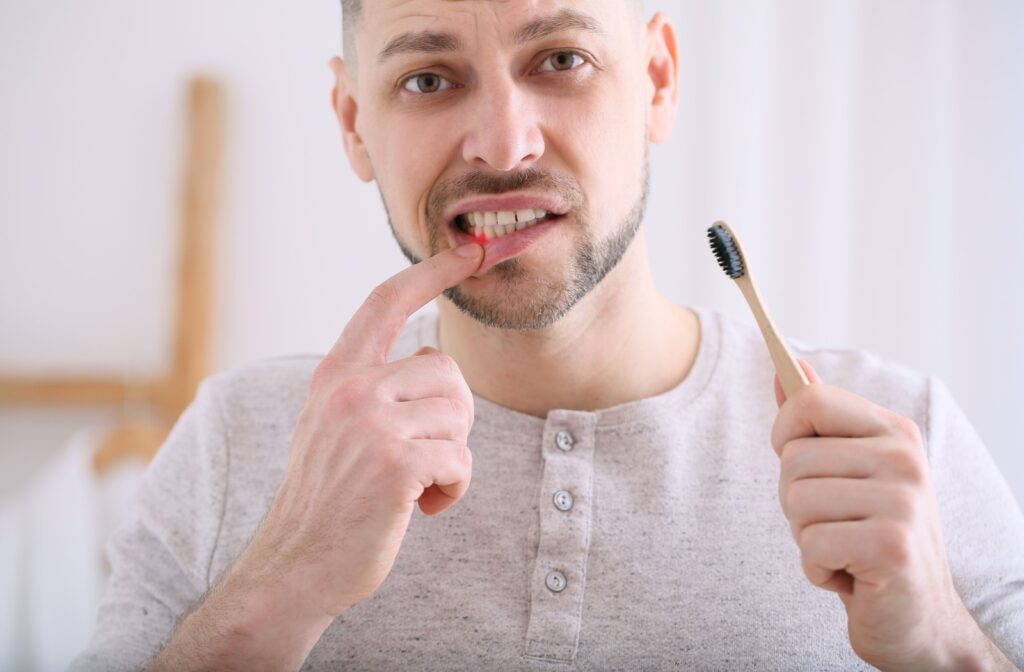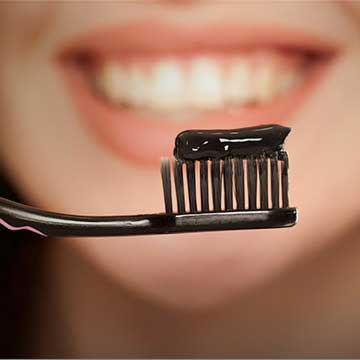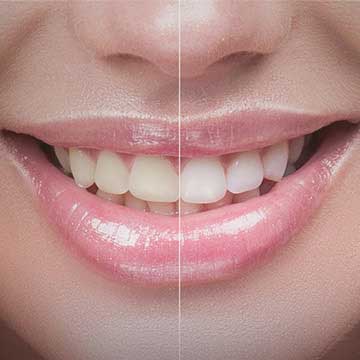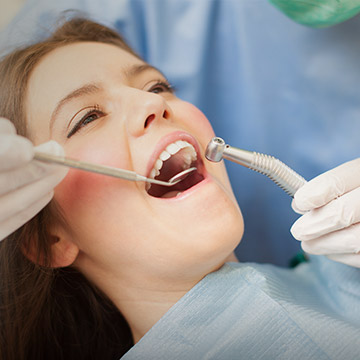You pull out your dental floss, ready to finish your oral hygiene routine, but a few passes between your teeth reveal something concerning: blood on the floss. It’s a moment that catches many people off guard, and it’s a common concern patients bring to their dentist. While it can feel unsettling, bleeding gums during flossing often serve as your mouth’s early warning system rather than a reason to panic.
Bleeding gums when flossing are most often linked to gingivitis, the earliest stage of gum disease, but other factors such as flossing technique, medications, hormonal changes, and certain health conditions can also play a role.
The Most Common Cause: Gingivitis
When your gums bleed during flossing, the most likely culprit is gingivitis, the earliest stage of gum disease. Gingivitis occurs when plaque buildup along your gum line causes inflammation and irritation. Plaque is a sticky film of bacteria that constantly forms on your teeth. When you don’t remove it through proper brushing and flossing, it hardens into tartar, which can only be removed by a dental professional.
This buildup irritates your gums, making them tender, swollen, and prone to bleeding. The inflammation from gingivitis makes your gum tissue more fragile. When you floss, even with gentle pressure, the inflamed gums are more likely to bleed.
Other Potential Causes of Bleeding Gums
While gingivitis is the primary reason for bleeding during flossing, several other factors can contribute to this issue:
Flossing Technique
If you’re new to flossing or haven’t maintained a consistent routine, your gums may bleed simply because they’re not accustomed to the cleaning process. Aggressive flossing or using improper technique can also cause bleeding, even in healthy gums.
Hormonal Changes
Pregnancy, menstruation, and menopause can make gums more sensitive and prone to bleeding. The hormonal fluctuations during these times increase blood flow to the gums and can make them more reactive to plaque buildup.
Medications
Certain medications, particularly blood thinners, can make your gums more likely to bleed. If you’ve recently started a new medication and notice increased bleeding, mention this to your dentist or doctor.
Medical Conditions
Some health conditions, such as diabetes, vitamin deficiencies, or blood disorders, can affect your gum health and contribute to bleeding. These conditions may also slow your body’s ability to fight off infections, including gum disease.
Bleeding Gums Linked to Advanced Gum Disease
If left untreated, gingivitis can progress to periodontitis, a more serious form of gum disease. This advanced stage affects not just your gums but also the supporting structures of your teeth, including the bone.
Signs that bleeding gums may indicate periodontitis include:
- Persistent bad breath
- Gums that pull away from teeth
- Loose or shifting teeth
- Deep pockets forming between teeth and gums
- Changes in your bite
Periodontitis requires professional treatment and can lead to tooth loss if not addressed promptly. This is why early intervention for bleeding gums is so important.
How to Stop Your Gums From Bleeding

The encouraging news is that gingivitis is reversible with proper oral care. Here’s how you can work toward healthier, non-bleeding gums:
- Improve your daily oral hygiene: Brush twice daily with a soft-bristle toothbrush and fluoride toothpaste. For flossing, use a gentle sawing motion to guide the floss between your teeth, then curve it around each tooth in a C-shape.
- Stay consistent: It may seem counterintuitive, but continuing to floss daily is important, even if your gums are bleeding. If you see blood, keep flossing!
- Schedule professional cleanings: Regular dental cleanings remove the tartar buildup that you can’t eliminate at home.
When to See a Dentist About Bleeding Gums
While occasional minor bleeding when you first start flossing regularly isn’t unusual, certain situations warrant professional attention:
- Bleeding persists after 2 weeks of consistent, proper oral care
- Your gums are severely swollen, red, or painful
- You notice pus around your gum line
- You experience persistent bad breath
- Your teeth feel loose or your bite has changed
- You have other symptoms like fever, alongside gum bleeding
Don’t wait if you’re experiencing these more serious symptoms. Early intervention can prevent minor gum issues from becoming major problems.
How to Stop Your Gums from Bleeding
Bleeding gums when flossing are often your mouth’s way of signalling that your gums need extra care. The encouraging news is that with consistent home care and professional support, you can restore gum health and stop the bleeding.
At Otara Dental, our team provides gentle, personalized care to help you feel confident in your oral health routine. Whether you’re dealing with bleeding gums or just want to prevent future issues, we’re here to support you every step of the way. Book your appointment with Otara Dental today and take the first step toward healthier gums and a brighter smile.









